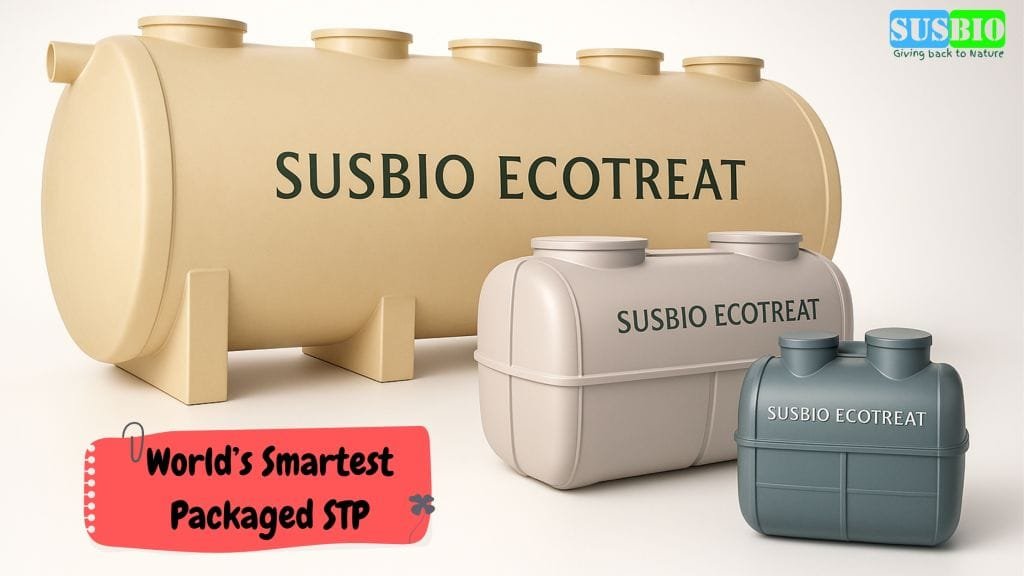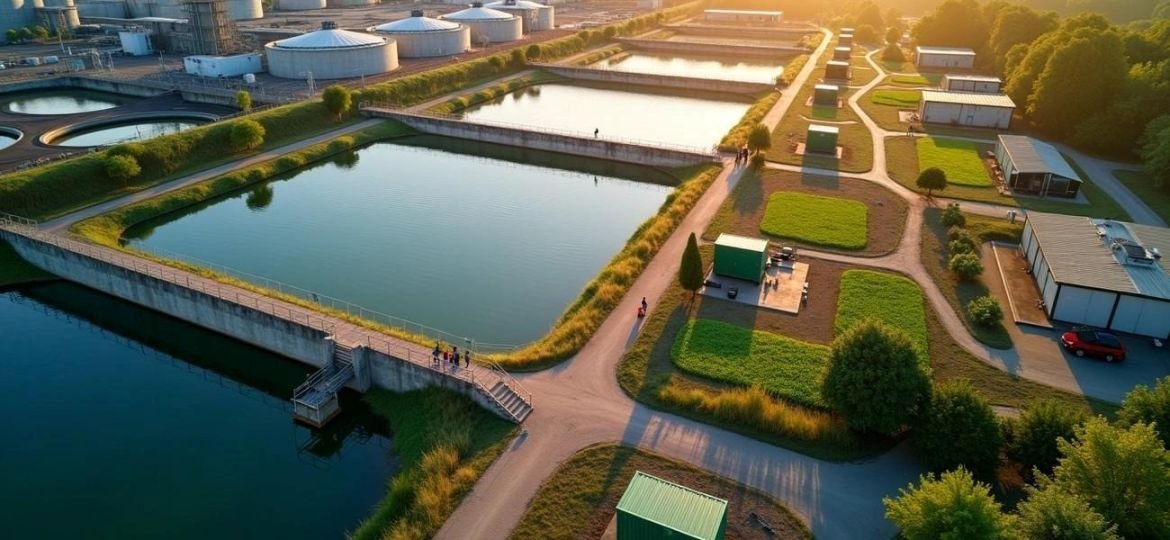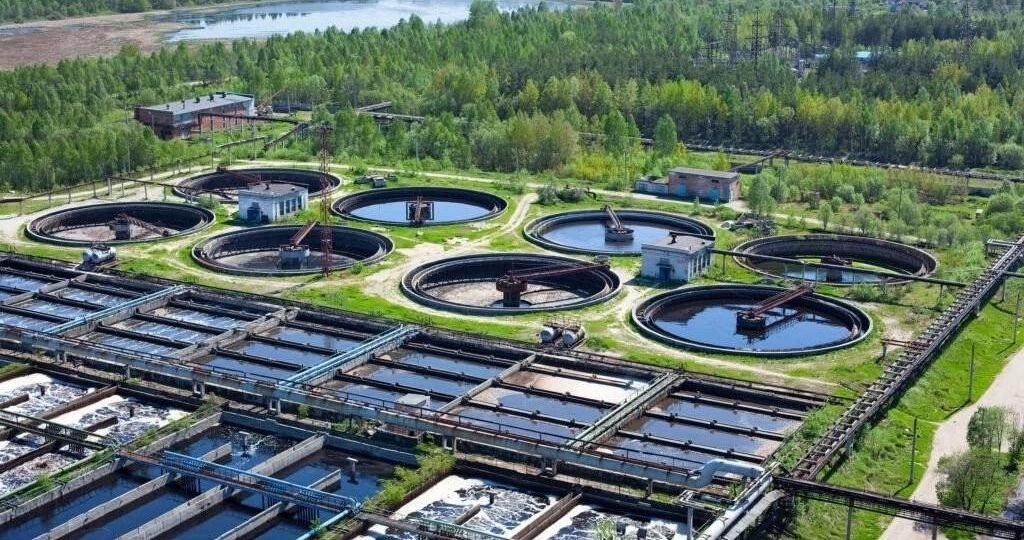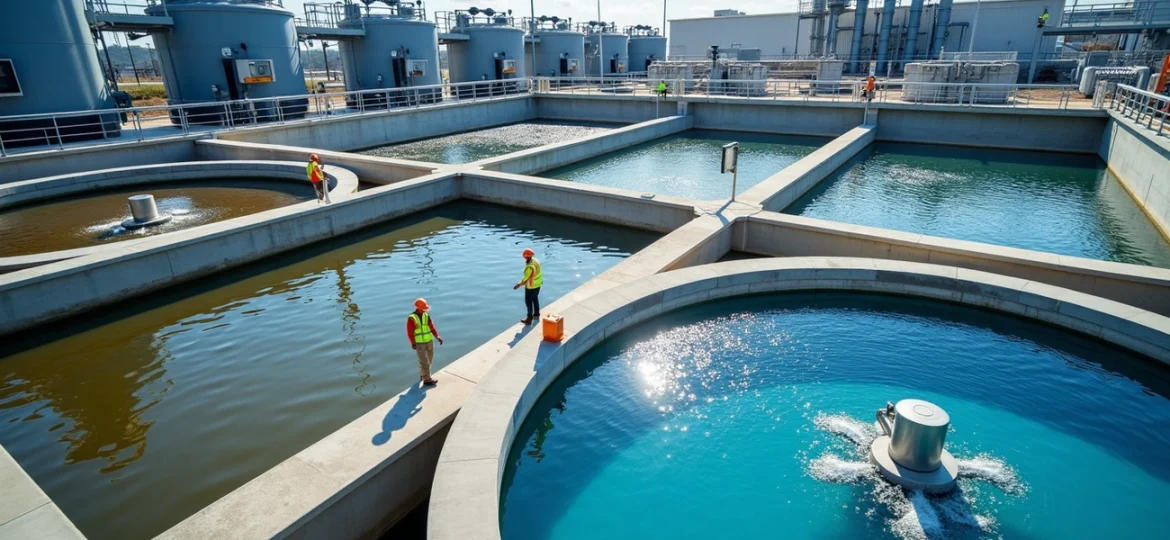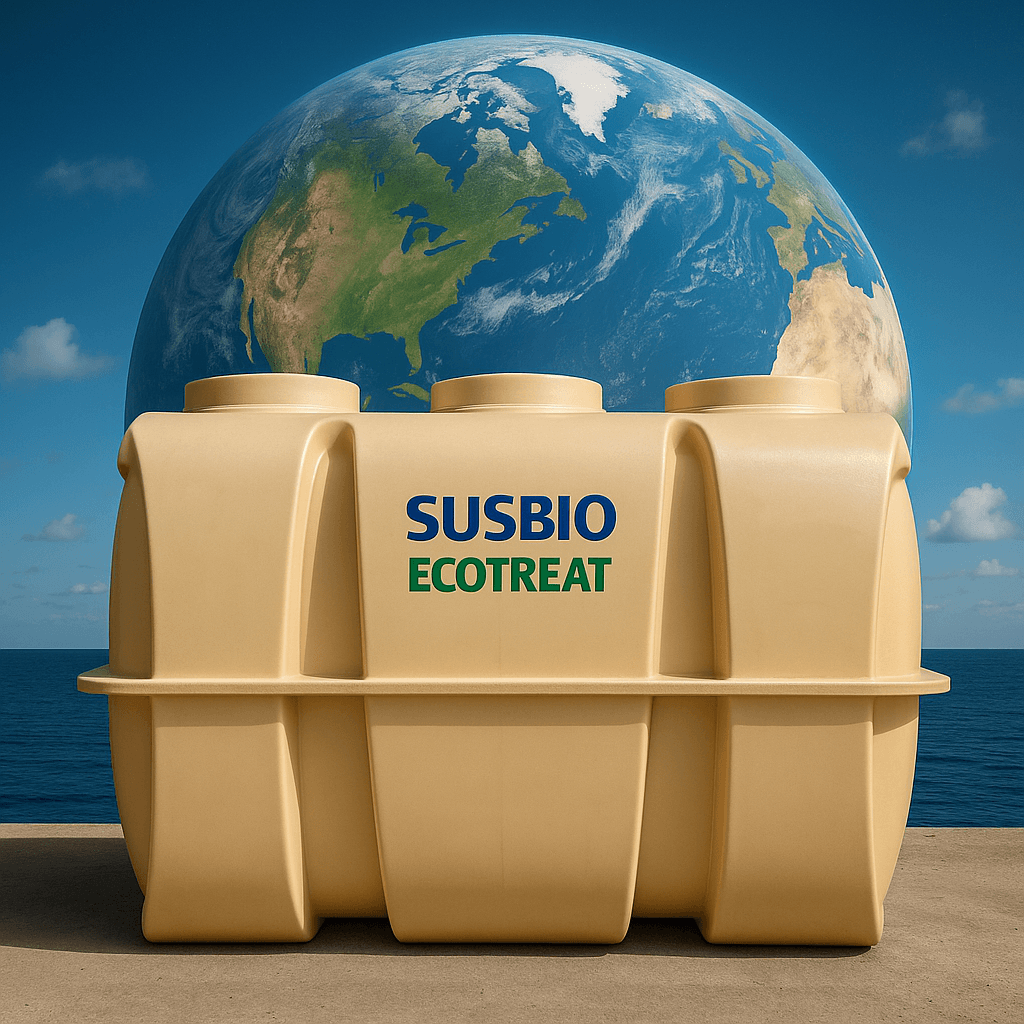The numbers are shocking – only 20% of the 400 km³ of wastewater generated globally each year gets proper treatment. Even worse, just 2-15% ends up being reused for irrigation. Fresh water has become nowhere near enough in many farming regions throughout India and worldwide. This shortage affects farming, industry and homes alike.
Treated sewage wastewater provides a practical solution where water is scarce. Many regions use 80% of their fresh water for farming, which makes wastewater reuse crucial for green farming practices. Egypt’s story shows this well. The country faces a yearly water deficit of 54 billion cubic meters, but treated wastewater contributes about 20 billion cubic meters to agriculture annually. Treated wastewater gives farmers a steady supply even in dry seasons. The water comes packed with nutrients like nitrogen, phosphorus, and potassium that help plants thrive.
As I wrote in this piece, reusing sewage and wastewater brings multiple benefits to farming – from reliable irrigation throughout the year to better soil quality. The discussion will cover the enabling technologies, safety measures, and the economic benefits these systems bring to farming operations.
Treated Wastewater as a Reliable Irrigation Source
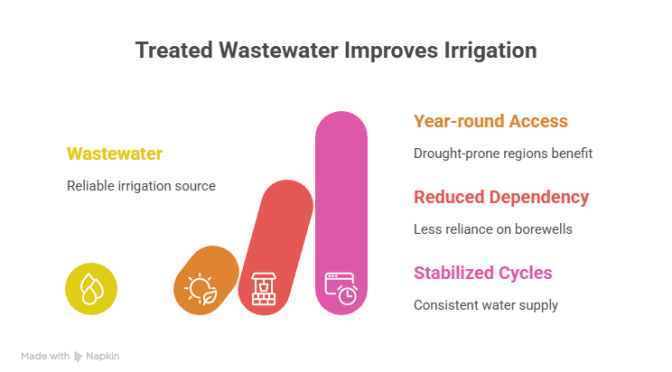
The lack of water creates major challenges for farmers, particularly in arid and semi-arid regions. Treated wastewater provides a practical solution that changes agricultural irrigation methods. This approach helps solve many problems that modern farming communities face.
Year-round availability in drought-prone regions
Farmers in water-scarce regions can access treated wastewater continuously for crop irrigation, even during droughts (73.5%). This reliable source helps address one of the biggest challenges – reduced river flow, which affects 82.4% of farmers. Climate change makes these conditions worse, and treated sewage wastewater becomes more valuable to maintain farm output and resilience. Countries currently reuse only about 20% of their produced treated wastewater, which shows there’s still much room for improvement.
Reduced dependency on borewells and rivers
Farmers who use treated wastewater in agriculture rely less on traditional freshwater sources. Their approach helps save vital groundwater resources and prevents aquifer depletion from excessive pumping. Treated wastewater pumped through boreholes helps restore and maintain the health of stressed aquifers. Bengaluru’s situation demonstrates these benefits – the city must pump freshwater 350 meters uphill across 90 kilometers from the Cauvery river. Using treated wastewater cuts both costs and carbon emissions. SUSBIO ECOTREAT, India’s most advanced packaged STP, offers a future-ready solution for this transition.
Stabilizing crop cycles through consistent water supply
Unreliable water supply often disrupts farming operations. In spite of that, farmers can schedule irrigation quickly with treated wastewater without depending on rainfall. The consistent supply leads to better crop planning and stable yields. In fact, 78.1% of farmers report higher agricultural yields when using treated wastewater. This reliable water source helps farmers maintain steady production schedules despite seasonal changes, which creates stronger agricultural systems as water becomes more unpredictable.
Nutrient-Rich Effluent for Soil and Crop Enhancement
Treated wastewater does more than irrigate crops – it’s a treasure trove of plant nutrients that improves soil quality. This double advantage makes agricultural wastewater treatment an attractive option for environmentally responsible farming.
Nitrogen and phosphorus content in treated sewage wastewater
Sewage wastewater contains 3-5% nitrogen, 2-3% phosphorus, and 0.5-1% potassium. These nutrients support plant growth without extra supplements. The global treated wastewater supply holds 16.6 Tg of nitrogen, 3.0 Tg of potassium, and 6.3 Tg of phosphorus each year. This meets about 13.4% of agriculture’s total nutrient requirements worldwide. Advanced treatment systems like SUSBIO ECOTREAT, India’s leading packaged STP, deliver optimal nutrient levels while eliminating harmful elements.
Reduced use of synthetic fertilizers
Using nutrient-rich sewage wastewater reduces dependency on manufactured fertilizers. Research shows wastewater irrigation can replace 54% of nitrogen fertilizer needs for crops like fennel and lettuce. Plants irrigated with treated wastewater show better growth, larger leaf area, and higher total biomass. This matters because synthetic fertilizer production releases about 600 million tons of carbon dioxide yearly. Wastewater reuse offers an eco-friendly alternative.
Improved soil structure and moisture retention
Treated wastewater benefits go beyond providing nutrients. Studies show it increases organic matter by 35-42% and improves cation exchange capacity by up to 67% in some crops. The organic elements in treated effluent build stronger soil structure, retain more moisture, and boost microbial activity. These changes create perfect conditions for healthy plant growth and lasting agricultural output.
Monitoring salinity and heavy metals for long-term soil health
The benefits are clear, but proper monitoring remains crucial for sustainable wastewater treatment in agriculture. Regular testing checks for heavy metals such as lead, copper, chromium, zinc, cadmium, and nickel to ensure soil safety. Well-managed sewage and wastewater can support at least three farming cycles without dangerous heavy metal buildup. Salt content needs constant monitoring too, as rising salinity could damage soil structure and affect agricultural sustainability.
Advanced Treatment Technologies for Safe Agricultural Use
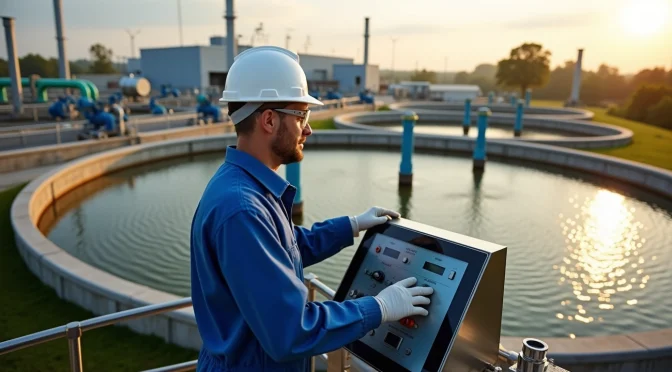
Agricultural wastewater treatment needs sophisticated technologies to ensure safety and meet regulatory standards. The treatment method you choose affects which crops can receive the treated water. It also determines how farmers can apply it in their operations.
Primary and secondary treatment for restricted irrigation
Primary treatment removes 25-50% of incoming BOD and 50-70% of suspended solids through sedimentation and skimming processes. This simple level is enough for crops not consumed by humans, like orchards and vineyards, but requires careful application methods. Biological processes in secondary treatment reduce organic matter further and remove about 85% of BOD and suspended solids found in raw wastewater.
Tertiary treatment using UF, RO, and MBR systems
Crops that humans eat directly need tertiary treatment. Ultrafiltration (UF) membranes can remove particles as small as 0.01 microns, including bacteria and viruses. Membrane bioreactors (MBR) merge biological treatment with membrane filtration to produce superior water quality. A newer study, published in showed that a membrane-based Integrated Fixed-Film Activated Sludge (IFAS) system produced water that met all EU regulations for agricultural reuse.
Disinfection methods: UV, ozone, and chlorination
Disinfection eliminates remaining pathogens before agricultural use. Chlorination needs 5-15 mg/l dosage and 30-120 minutes of contact time. UV radiation offers an alternative that disrupts microbial DNA without leaving chemical residuals, making it perfect for sensitive crops. Ozone works as a powerful oxidant that destroys pathogens by breaking down their cell walls.
SUSBIO ECOTREAT: India's most advanced packaged STP
SUSBIO ECOTREAT leads as India’s most advanced packaged sewage treatment plant. Its unique dual-treatment process combines anaerobic and aerobic methods to purify wastewater better. The system starts with oil separation and primary sedimentation. It continues through anaerobic treatment, aerobic processing with Moving Bed Biofilm Reactor technology, final sedimentation, and disinfection.
Real-time monitoring of BOD, COD, and pathogen levels
Immediate monitoring helps optimize wastewater management. Traditional BOD5 tests need five days to complete, but modern systems like the Proteus multiparameter water quality sonde provide instant readings. Treatment plants can adjust their processes quickly based on incoming load variations. This optimization saves energy while maintaining consistent quality for agricultural applications.
Plug-and-Play Installation with Minimal Civil Work
SUSBIO ECOTREAT arrives pre-assembled, which cuts installation time by 70%. The packaged STP plant needs only a concrete base and connection points. This eliminates the need for extensive excavation work.
90% Less electricity consumption and noiseless stp

Health, Safety, and Economic Benefits of Wastewater Reuse
Safety protocols are vital for working with treated wastewater in agriculture. Health safeguards and economic benefits make agriculture wastewater treatment a great investment for environmentally responsible farming operations.
Protective gear and training for farm workers
Farm workers need to avoid any direct contact with untreated water. Protective equipment like gloves, boots, and masks reduce health risks by a lot. The core team needs proper training on safe irrigation practices and hygiene, along with clear work rules to follow the right procedures. These precautions prevent health issues like skin irritations that most workers consider normal job hazards.
Drip and subsurface irrigation to reduce crop contact
Research shows that subsurface drip irrigation leads to lower coliform levels in soil and crops. This system delivers water straight to the root zone and minimizes aerosol formation, which creates a safer environment for nearby communities. Subsurface irrigation has proven to be much safer than surface methods. The research demonstrates a 2-4 log reduction in pathogens.
Cost savings on water and fertilizer inputs
Farmers can save money on freshwater extraction and fertilizer by using treated sewage wastewater. These savings help cover the original setup costs of pipes, pumps, and treatment units. Some regions offer treated wastewater for free or at subsidized rates, which gives farmers more reasons to adopt this approach.
Job creation in treatment and monitoring services
Wastewater reuse projects create jobs in treatment plant operation, system maintenance, and testing laboratories. Technicians, operators, and laboratory staff get steady employment opportunities in rural areas. SUSBIO ECOTREAT, India’s most advanced packaged STP, needs skilled workers to operate. This creates more jobs while providing a future-ready solution for agriculture wastewater treatment.
Conclusion
Treated wastewater has emerged as a revolutionary resource for agricultural sustainability worldwide. Research shows that agriculture wastewater treatment tackles multiple challenges and creates new opportunities for farmers. The most compelling evidence reveals that reused treated sewage water provides reliable irrigation during droughts and enriches soil with essential nutrients. This reduces farmers’ dependency on synthetic fertilizers by up to 54%.
Safety plays a crucial role in system implementation. Quality treatment technologies are the foundations of successful wastewater reuse programs. SUSBIO ECOTREAT, India’s most advanced packaged STP, demonstrates this through its innovative dual-treatment process. This future-ready solution turns former waste into valuable agricultural input.
The economic advantages make a strong case for wastewater reuse. Farmers cut costs substantially on water and fertilizers. Communities benefit from new jobs in treatment operations and monitoring services. Environmental benefits prove equally valuable – preserving freshwater reserves, cutting fertilizer runoff, and boosting soil health for long-term productivity.
Water will become scarcer without doubt as climate change and population growth continue. Therefore, treated wastewater represents not just an alternative but a necessity for agricultural resilience. Countries that use only 20% of their treated wastewater potential have room to grow substantially.
Note that successful implementation relies on complete monitoring, proper application methods, and worker safety protocols. Well-managed treated wastewater evolves from a disposal challenge into an environmentally responsible solution. This supports food security, saves resources, and builds stronger agricultural communities. Tomorrow’s farming success depends on knowing how to close the water cycle – converting today’s waste into tomorrow’s sustenance.
Key Takeaways
Treated wastewater emerges as a critical solution for agricultural water scarcity, offering farmers reliable irrigation while enhancing soil quality and reducing costs.
- Reliable year-round water supply: Treated wastewater provides consistent irrigation even during droughts, with 78.1% of farmers reporting increased yields when using this resource.
- Natural fertilizer alternative: Sewage wastewater contains 3-5% nitrogen and 2-3% phosphorus, reducing synthetic fertilizer needs by up to 54% while improving soil organic matter by 35-42%.
- Advanced treatment ensures safety: Technologies like UV disinfection, membrane filtration, and systems like SUSBIO ECOTREAT make wastewater safe for agricultural use through comprehensive purification processes.
- Significant cost savings: Farmers save substantially on freshwater extraction and fertilizer purchases, while proper safety protocols like subsurface irrigation minimize health risks.
- Massive untapped potential: With only 20% of global treated wastewater currently reused, there’s enormous opportunity to address water scarcity while creating jobs in treatment and monitoring services.
The transformation of wastewater from waste to resource represents a sustainable pathway toward agricultural resilience, environmental conservation, and food security in an increasingly water-scarce world.
Frequently Asked Questions
Q1. What are the main advantages of using treated wastewater in agriculture?
Treated wastewater provides a reliable year-round water supply for irrigation, especially during droughts. It also contains essential nutrients like nitrogen and phosphorus, which can reduce the need for synthetic fertilizers. Additionally, it helps conserve freshwater resources and improves soil structure and moisture retention.
Q2. How does treated wastewater benefit soil health?
Treated wastewater enhances soil quality by increasing organic matter content by 35-42% and improving cation exchange capacity. It also boosts soil structure, moisture retention, and microbial activity, creating ideal conditions for robust plant development and sustained agricultural productivity.
Q3. Is it safe to use treated wastewater for crops consumed by humans?
Yes, when properly treated and monitored. Advanced treatment technologies like ultrafiltration, reverse osmosis, and membrane bioreactors, along with disinfection methods such as UV radiation and ozonation, ensure that the water is safe for use on crops intended for human consumption. Regular monitoring of water quality parameters is essential to maintain safety standards.
Q4. What economic benefits does wastewater reuse offer to farmers?
Farmers can save significantly on water and fertilizer costs by using treated wastewater. The consistent water supply allows for better crop planning and yield stability. Additionally, the nutrient content in treated wastewater can reduce or eliminate the need for synthetic fertilizers, further lowering input costs for farmers.
Q5. How can the health risks associated with using treated wastewater be minimized?
Health risks can be minimized through proper safety protocols, including providing protective gear and training for farm workers. Using drip or subsurface irrigation methods reduces crop contact with the water and lowers pathogen transmission. Regular monitoring of water quality, including testing for heavy metals and salinity levels, is crucial for maintaining long-term soil and crop health.


